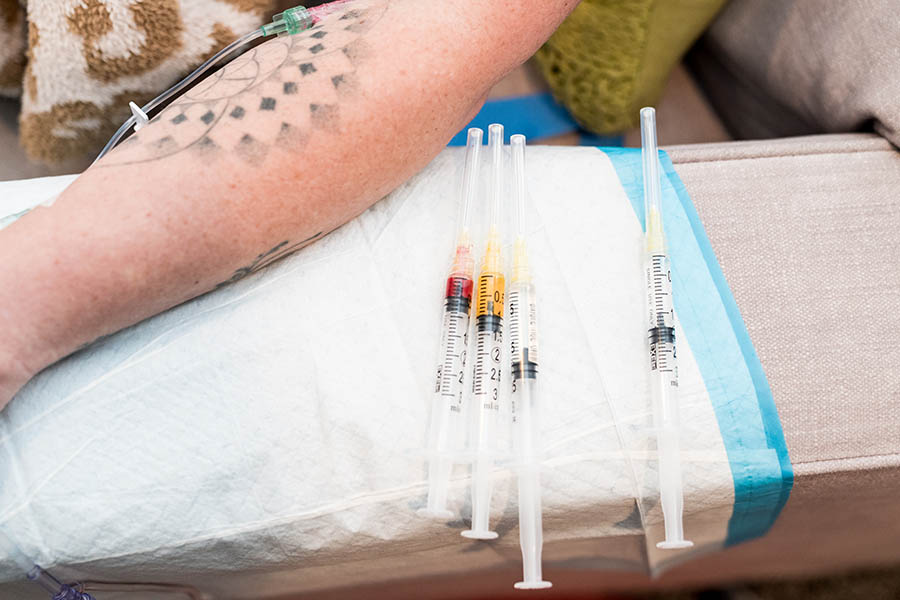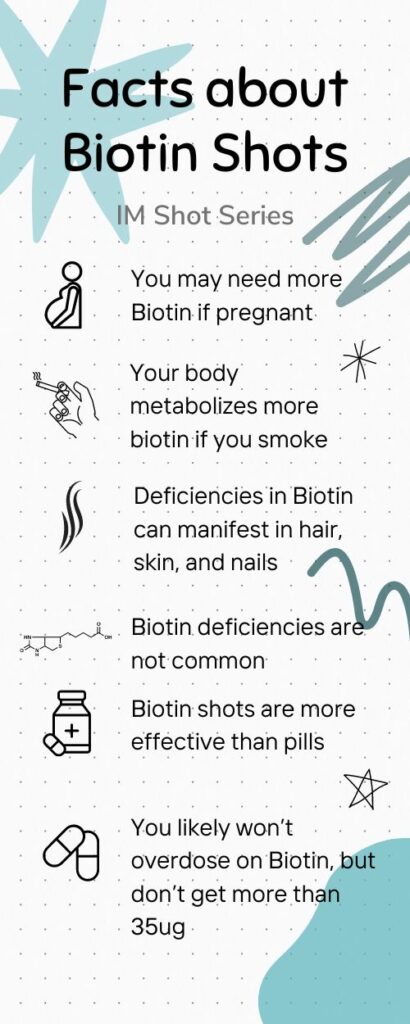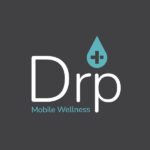For this installment of the IM shot series, we’ll do a deep dive on biotin shots. What they are, how they compare to oral supplements, and the benefits you might receive. If you missed our features of vitamin D, zinc, or glutathione, give those a read as well! Without further ado, let’s get into everything you need to know about biotin shots!

Biotin, otherwise known as B7, is a water based vitamin that can be found in some foods and offers a lot of benefits. It is recommended that 5-35ugs should be taken each day, depending on an individual’s circumstance. Though biotin deficiency is rare, it can happen. Those who are pregnant or nursing may need more biotin than those who aren’t due to an overall need of additional nutrients.
Biotin is one of those essential B vitamins that most people don’t need to supplement. Deficiencies in biotin, however, can cause some adverse symptoms such as growth delays in children, and poor hair and skin health. On the contrary, there are plenty of benefits that an adequate amount of biotin in one’s diet can supply:
Skin and nail health: Although increased biotin intake has not been clinically shown to improve skin and nail health, those struggling with non-adequate amounts of biotin will experience issues with their skin and nail health. Those who metabolize biotin quicker, such as those who smoke, may notice that their skin and nails are not in the best condition. Biotin is important to maintaining healthy skin and nails.
Biotin Shots for Hair: Similar to skin and nails, increased amounts of biotin haven’t necessarily been linked to increased hair growth. However, those who are deficient in biotin or who metabolize it much quicker, will experience some negative effects. Continued research is being done on if increasing biotin levels can function as an aid to brittle hair.
Glycemic Control: Biotin has also been shown to aid in glycemic control for those who have type II diabetes. Monitoring and controlling blood glucose and lipid levels is very important for those with type II diabetes. Adequate and supplemented biotin can aid in regulating those levels.

If you have a need to supplement biotin, both biotin shots and pills are viable options. However, it is good to know the difference between the two so you can make an educated decision on your preference.
Biotin shots, administered via injection, offer a concentrated and immediate dose of biotin directly into the bloodstream. This method may be preferred for individuals with specific deficiencies or seeking rapid results for hair, skin, and nail health. Injections, by nature of administration, are more uncomfortable to get than a pill would be; however if you opt to work with a mobile provider like Drp IV, you can still experience the same level of convenience.
On the other hand, biotin pills offer convenience and ease of use, as they can be taken orally with water. They provide a more gradual release of biotin into the body, which may be preferable for those seeking a sustained supplementation regimen without the need for frequent injections. However, absorption rates may vary, and it may take longer to notice results compared to injections.
Ultimately, the choice between biotin shots and pills depends on individual preferences, needs, and lifestyle factors.
A biotin shot provides a concentrated dose of biotin (B7) that is essential for metabolizing fats, carbohydrates, and amino acids. It is often used to promote healthy hair, skin, and nails and can be used to control glucose levels.
The choice between biotin shots and pills depends on individual preferences and needs. Biotin pills offer convenience and can be taken orally, while biotin shots provide a more immediate and concentrated dose, yielding faster results for those with specific deficiencies or concerns. The bioavailability of biotin shots is also much greater than a pill can offer.
The frequency an individual gets a biotin shot depends on circumstances, such as existing deficiencies or desired outcomes. Generally, we recommend periodic injections ranging from weekly to monthly, but it’s essential to consult your primary care physician for more personalized advice.
Biotin injections are generally considered safe when administered by a qualified healthcare provider, such as our highly trained nurses. However, as with any medical treatment, there may be risks or side effects, particularly if administered improperly or in excessive doses. If you have concerns about risks, be sure to consult with your primary care physician or the nurse administering the treatment.
https://www.ncbi.nlm.nih.gov/pmc/articles/PMC9659605/
https://www.ncbi.nlm.nih.gov/books/NBK554493/

Drip Admin has written several informative articles and guides on the benefits of IV therapy, emphasizing the science behind the practice. Our writing style is engaging, concise, and accessible, making complex medical concepts easily understandable for readers.